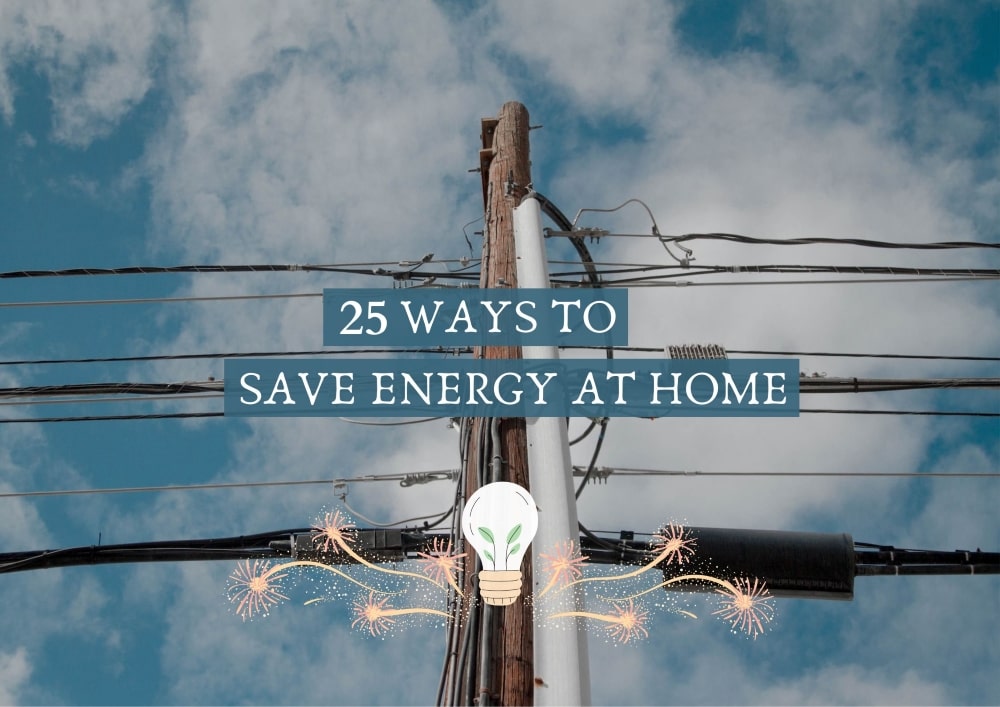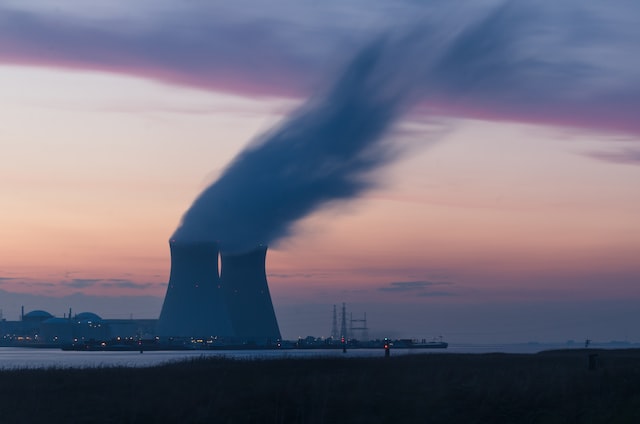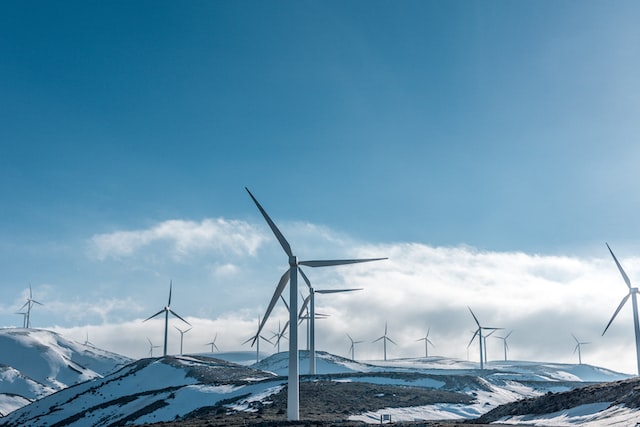This blog post is about how to save energy at home.
Almost everything we do in a day involves electricity. The breakfast from the fridge, warm water for a morning shower, lights in the bathroom, clean clothes from the washing machine, clean dishes from the dishwasher, a charged laptop and cellphone ready for a day of work, the stove you cook dinner on… I could go on for a while!
We are, quite literally, dependent on electricity. Unfortunately the electricity price has gone up like crazy recently, especially in northern Europe. Therefore if you live in a cold country like Sweden and have electric heating in your home, you could be up for a grandiose electricity bill this winter!
Nobody wants a higher electricity bill. That’s why people now actually make an effort in saving energy! Not only will this save you money but using less energy is great for the environment, and contributes to a healthier planet.
Keep reading to learn practical tips on how to save energy in your home and save the planet and your wallet some precious resources!
Why Saving Energy is Good for the Earth
How does saving energy at home actually contribute to a healthier earth? And does saving energy matter if you only get electricity from renewable energy sources? Well here are the answers you are looking for.
Fossil fuels
A power plant can be driven by fossil fuels. When fossil fuels are being burned, CO2 emissions and toxic fumes are released into our ecosystem. These CO2 emissions contribute to climate change and the toxic fumes impact our health (and the health of other living beings) negatively. The extraction process of fossil fuels is also bad for the environment, as potential oil spills are incredibly harmful to wildlife and their habitats.
By using less energy we reduce the need for energy production in power plants. This in turns leads to less fossil fuels being burned, less CO2 emissions and toxic fumes and less environmental damage from fossil fuel extraction. Therefore, saving energy is good for the earth!
Nuclear energy
A power plant can also be driven by nuclear energy. For that process the element uranium is needed. But both the extraction of uranium and the radioactive waste is dangerous for human health. Furthermore, the radioactive waste has to be stored somewhere for 100,000 years until it becomes harmless. Therefore the process of producing nuclear energy and waste storage is a risk for the health of the entire planet.
By saving energy we reduce the need for energy production. This will eventually lead to needing fewer operating nuclear plants, less extraction of uranium from the earth and less radioactive waste. Of course this will greatly benefit the planets and future generations!
Renewable energy
If the electricity comes from a renewable energy source, you won’t have to worry as much about CO2 emissions or radioactive waste. But even if it comes from a renewable source, the energy you use will still have an effect on the environment. That’s why it will also still be beneficial to save energy.
If we start to use less electricity, we will eventually require less solar panels (which requires materials and energy to create), less hydroelectric plants (which alters the ecosystem for water animals and animals living around water) and less wind turbines (taking up space and destroying natural habitat for wildlife). Conserving more energy from renewable energy will therefore help to sustain a healthy ecosystem and requires less nature to be altered.
To sum it all up, saving energy will:
-
- Decrease the need for power plants.
- Lower demand for fossil fuels.
- Reduce pollutants from burned fossil fuels (CO2 and toxic fumes).
- Slow down climate change.
- Save the environment from damage from extracting fossil fuels and uranium.
- Creates less radioactive waste.
- Alter less nature for hydroelectric power plants, wind turbines, solar panel fields and other renewable energy sources.
- Conserve natural resources.
The conclusion: Saving energy will always be beneficial for both the planet and your wallet, regardless of where the energy comes from.
Top 3 Energy Consuming Home Appliances
1. Heating and Air Conditioning.
On the top of this list is heating and cooling your living space. It takes about 42% of the energy in an average household in the USA and 62.8% in an average household in Europe.
2. Water heating
The second most consuming things is heating up water. It takes about 14% of the total energy used in a household both in the USA and in Europe.
3. Household appliances
The third thing that consumes the most energy are electrical household appliances. For example are refrigerators, freezers, washing machines, dryers, ovens, stoves and dishwashers. It takes about 10.3% of the total energy in the USA 13% of the total energy (electrical appliances) in Europe.
25 Ways to Save Energy at Home
Here are 25 easy and smart ways to save energy at home. Some of these will be more or less effective for saving money, depending on if you live in a house or rent an apartment where heat and water are included. Nevertheless, saving energy will always be beneficial for the earth!
1. Lower the temperature in your home (winter)
An effective way to save energy at home is to lower the temperature a few degrees. Make it a habit to put on more layers of clothes instead of turning the heat up! Furthermore, shut the doors to rooms that are colder to keep the heat in the rooms your spend the most time in. It can also be really cozy to use blankets to keep you warm while relaxing, instead of turning the heating up.
2. Use less air conditioning (summer)
Instead of setting the air-conditioning temperature really cold on a hot summer day, try to keep the heat out instead. Close curtains and windows to keep the warming sunlight out and avoid using heat producing appliances (like the oven or stove) until its cooler outside. Once the temperature drops outside, open your windows to cool down your home!
3. Insulate your home
To keep the desired temperature in your home it is very important that your home is insulated properly. Walls, roofs, ceilings and floors should be well insulated to keep the heat inside. Otherwise, that cool air or heat escapes and makes your heating system/air-conditioning work harder to keep the desired temperature. This will take a lot of energy, which you of course will have to pay for. The attic is another important place to insulate properly, as heat rises and likes to escape that way too.
4. Insulate your water heater and water pipes
Another effective way to save energy at home is to insulate your water heater and water pipes. As the insulation will reduce heat loss, your water heater will have to work less and therefore saves a lot of energy. Insulating the water pipes will also keep the water warm longer while it travels to where it’s needed, which is both great for saving energy and water.
5. Draught proof windows, doors and check the ventilation systems
To reduce heat loss and save energy at home, be sure to draught proof gaps around windows, doors and other holes in the building that lead outdoors. For example you could use weather strips to seal windows and doors and/or use heavy curtains in front of the windows to keep the cold out. Also make sure the ventilation systems work correctly and check it for holes, clogs and leaks.
6. Take showers instead of baths.
Taking showers uses much less warm water than taking baths. A bath filled up one third of the way roughly equals a 19 minute long shower! It takes energy to warm up all that water and because a shower requires less water than a bath, it therefore saves energy.
7. Shorten your showers and wash you hair less (it will thank you!)
Reduce your shower time to save energy at home. You can try to take quicker showers or reduce the number of showers you are taking. If you have a gym membership and are going to the gym to workout anyways, an easy hack to save energy at home is to shower at the gym instead.
Another hack is to not wash your hair every day. Not only is it a time consuming procedure to shampoo and condition long hair, but washing your hair a little less can actually make your hair healthier!
✧ Read: The Best Natural Shampoo and Conditioner
8. Turn off the water while brushing teeth/shaving/shampooing
Save both water and energy in your home by making it a habit to turn off the water faucet while brushing your teeth or shaving. You can use this hack with showering too. If you don’t want to wash you hair less or reduce your showers, just turn of the water while lathering up with soap or washing your hair!
9. Get a low-flow shower head and water faucet
Getting a low-flow shower head faucet will reduce water usage without reducing the water pressure. This will save warm water and therefore save energy, especially when taking a hot shower. This works the same with a low-flow water faucet.
10. Don’t do the dishes under running water/don’t run a half full dishmachine
Turn off the water faucet when doing the dishes if you do them by hand. Buy bowls to do the dishes in instead. Fill one bowl with warm water and a bit of soap to do the dishes in and the other one with a layer of cold water to easily rinse them off. This will save both energy and water.
If you have a dishwasher make sure its full before you start the program so you don’t run it unnecessarily. If there is a Eco-program, use that.
11. Wash at 30 degrees and only wash full machines
Like I mentioned before, heating water takes a lot of energy. That’s why you can save a lot of energy by washing your clothes at a lower temperature. Wash at 30 degrees when you can and avoid washing half full machines. However, don’t overload the washing machine either because then your clothes will not get clean.
12. Air dry your clothes instead of tumble drying
The tumble dryer is actually one of the household appliances that uses the most electricity. This means that you can save a lot of energy by hanging your clothes on a rack and letting them air dry instead of using the tumble dryer. Another benefit is that air drying is much better for your clothes and fabrics!
13. Defrost your freezer
Defrosting your freezer when it starts to get icy in there is another way to save energy at home. When ice is formed, the freezer has to work extra hard to keep all that ice cold which will use extra energy. Another thing to think of is to not put hot food in neither your freezer or fridge, as it will take more energy to cool it down. Also don’t place your cooling appliances next to a heater because of the same reason.
To furthermore make sure that your cooling appliances work effectively, keep the coils on the back clean. A good temperature is -18°C for the freezer, +4 to 5°C for the fridge.
14. Use a water boiler instead of a kettle
A water boiler uses less energy than a kettle on the stove to boil water. If you drink a lot of tea or require hot water during the day, a great hack is to boil water once in the morning a set a thermos to keep the water warm. That way you won’t have to use the water boiler multiple times a day just for a cup of tea.
15. Cook with the lids on
Cooking with the lids on will result in the contents getting warmer quicker as the heat is trapped under the lid. Therefore, using lids while cooking is an easy way to save energy when cooking.
16. Turn of the stove/oven a little early
Another hack to save energy at home is to switch of the heat of the oven or stove a little earlier. There will still be a lot of residual heat which continues to cook or bake the food until it’s ready. Also remove all the trays in the oven before using it, as it will allow a good airflow and distribute the heat easier.
17. Use an air fryer or slow cooker instead of the entire oven
Both an air fryer and a slow cooker uses way less energy than the oven. So if you are preparing something that can be made with an air fryer or slow cooker instead of the entire oven, choosing that will safe energy at home.
18. Switch to energy efficient appliances
If it’s time to buy new appliances because of whatever reason, look for energy efficient ones. In Europe, the most energy efficient appliances are marked by A+++ while the least energy efficient appliances are marked by G. In America, energy star rated appliances are the most energy efficient.
19. Turn off the lights
Think about the lights you use! It’s unnecessary to have all the lights on in your home as it will cost unnecessary energy. Make it a habit to turn off the lights when you leave a room and only have the lights on in the room that you’re currently in.
20. Replace your light bulbs to LED
Another way to save energy at home is to replace all your normal light bulbs to LED light bulbs. LED lights are the most energy efficient form of lighting. They use 60-90% less energy than incandescent or fluorescent lightning. If you don’t want to replace all of them, you could also only replace the ones you use the most!
21. Use candlelight instead of lamps
If you want to use even less energy, use candlelight as cozy lights instead of small lamps. This way it isn’t entirely dark in the room and it still looks super cozy with the light from the natural candle flame.
22. Switch of standby.
Switching off standby on your TV, gaming consoles, computer or other electronic appliances is one easy way to save energy at home. A good tip is to get a power strip with multiple sockets and a power switch. Then you can switch off all connected electronics in one go and avoid unnecessary energy costs from standby mode.
23. Unplug things you’re not currently using
To avoid ”vampire energy”, make sure you unplug things you are not currently using. Not only will this save energy at home, but you will also lower the risk for fires from forgotten plugged chargers.
24. Switch everything off when leaving your home
A great habit to have which will save energy at home is to switch of all electricity (except for maybe the fridge and freezer) when you are leaving your home. Unplug all power cords, turn off the WiFi and turn the heating off. This becomes even more important if you are going away for a longer period.
25. Use less entertainment electronics
Instead of watching TV every night, switch it up with electronic free activities like reading, board games or painting (add in anything else here). This will save energy and will also reduce the amount blue light you look at before going to sleep (which can disrupt you sleep cycle). A win win situation!
✧ Read: 10 Tips to Become more Present
Last Thoughts on Saving Energy at Home
Everyone benefits from using less energy. Not only does it reduce your electricity bill but it will also benefit the entire planet. Even if your efforts seem small, if you multiply it by 8 billion it makes an enormous difference.
All the tips above are practical ways to save energy at home. But if you truly want to know the most effective way for you personally, you’ll first have to check what you use the most energy on! With that knowledge, you can focus on saving energy in those areas.
Save the planet and your wallet some unnecessary costs today and start to live more energy efficient.
I hope you found some helpful tips on how to save energy at home!
By Bo Smit
Sources:
SUBSCRIBE TO EARTHY VIBES
Then you’ll like Earthy Vibes newsletters!
Read our Privacy Policy.








Loved this post! A lot of good tips that I can’t wait to be more mindfull on. Thanks Bo 🙂
This comment made me happy! Thank you for the appreciation <3